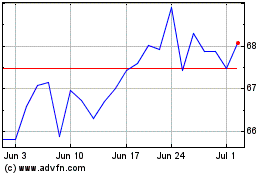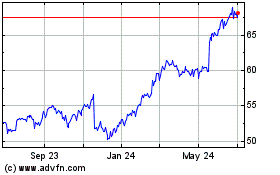By Paul Page
Sign up:With one click, get this newsletter delivered to your
inbox.
Amazon.com Inc. is pushing deeper into an unlikely growth area
for e-commerce retailers : brick-and-mortar stores. The company is
bulking up its grocery strategy with a plan to introduce
convenience stores with curbside pickup, the WSJ's Greg Bensinger
and Laura Stevens report. It's a high-stakes bid to bring new
competition to the retail industry by going after the grocery
business that provides big sales Amazon's biggest rival, Wal-Mart
Stores Inc. Amazon plans to bring its tech focus to the business,
combining smaller sites that hold perishable goods with online
ordering for customers that can pick up their groceries or provide
same-day delivery for items that have longer shelf life. They would
take a cue from discounters and dollar stores that have spartan
stores, private-label inventory and few employees. The effort
carries big logistics challenges: big-box retailers have used
grocery operations to lure customers into their stores, but Target
Corp. is still struggling to keep shelves stocked without letting
inventory costs spiral out of control.
Hanjin Shipping Co. is stepping in to help resolve the logistics
mess created by the carrier's thousands of empty containers. The
bankrupt shipping line is offering to pick up empties at two West
Coast port terminals "effective immediately," an action that should
help relieve some stress on sites now jammed up with the boxes.
Besides tying up space, WSJ Logistics Report's Erica E. Phillips
writes, thousands of the containers are attached to the wheeled
trailers known as chassis that are needed to move goods on and off
the docks. And some ports have stopped accepting Hanjin containers
because they don't have the space to store them. The confusion over
boxes is part of the supply-chain mess that's followed the South
Korean carrier's declaration of bankruptcy in August. Questions
over shipping payments and fees remain, however, and those may take
longer to resolve than it will take to clear away Hanjin's empty
containers.
The British pound's swoon has caught many corporate finance
chiefs off guard and left multinationals scrambling to assess the
impact. The pound's weakness since the Brexit referendum is forcing
many companies to adjust their foreign-exchange hedging, the WSJ's
Nina Trentmann reports, especially given that the currency is
expected to remain volatile at least until the U.K. begins
separation negotiations with its former EU partners. That's a big
concern to logistics companies that have operations that reach
across various borders, particularly since the currency shifts can
affect payments and revenue calculations. Higher costs are expected
to hit the supply chains of many importers, and many are adjusting.
Companies including German tire maker Continental AG and Swedish
paper producer Svenska Cellulosa AB have raised their prices to
meet the higher costs. The currency, which was trading at about
$1.46 to the pound at the start of the summer, extended its steep
post-Brexit slide on Tuesday, falling 2% to about $1.21.
SUPPLY CHAIN STRATEGIES
General Motors Co. is looking to close the door completely on
one of its longtime suppliers . The car maker is asking a judge to
end a litigation battle with bankrupt auto-parts provider
Clark-Cutler-McDermott Co., the WSJ's Sarah Chaney writes, in a
case that highlights the shifting landscape for auto companies and
the vast network of suppliers in a changing in manufacturing
industry. CCM, which filed for bankruptcy protection in July,
claims in a suit that GM lied in price negotiations and tricked the
company into a money-losing contract that buried the business in
debt. The 115-year-old company -- a GM "Supplier of the Year" four
times in the last seven years -- depended on GM for about 80% of
its business. The auto-parts is industry is under growing pressure
as car makers adjust to new consumer demands and scale up
technology in their vehicles, pushing companies across auto supply
chains to team up with new partners while adding features to their
components.
Samsung Electronic Co.'s botched recall of its Galaxy Note 7
smartphone puts a spotlight on the ability of companies to oversee
supply chains across a sprawling network of varied suppliers. That
concern has mounted as escalating demands in the technology world
put more pressure on companies to build and upgrade products more
swiftly, the WSJ technology team writes. The company initially
blamed the fires that finally crashed their new smartphone on one
bad battery supplier, but industry analysts suspect the company's
problems run deeper. Experts say supply-chain complexity can begin
within a company and be exacerbated when different departments
within a corporation, and their suppliers, fail to communicate or
coordinate effectively. Some believe developing blockchain
technology can help companies manage third-party suppliers, but
efforts to build true transparency across a full-blown global
supply chain remain challenging.
There's new research that suggests a relatively inexpensive way
to add highway capacity: get people to drive better. In fact,
Seattle engineer William Beaty says the strategies that researchers
call "jam-absorption driving" are relatively basic even if they can
seem counter-intuitive to most drivers. Mr. Beaty tells WSJ Work
& Family columnist Sue Shellenbarger he's advocating "things
that traffic experts and long-haul truckers have known forever."
Mr. Beaty counsels techniques such as leaving a large gap between
your car and the one in front and letting other drivers freely cut
in. The point is to eliminate stop-and-go frustration, and keep
vehicles moving at a steady, if seemingly slower, pace. Highway
planners already are designing roads, including the ability to use
information on accidents and variable speed limits, with such
strategies in mind. And researchers say that could make driving
easier even without adding roads.
QUOTABLE
IN OTHER NEWS
The U.K. and China agreed to remove any limits on cargo flights
between the countries. (WSJ)
U.S. agricultural officials are stepping in to help oversupplied
dairy farmers for the second time in less than three months,
pledging to buy another $20 million worth of cheddar cheese.
(WSJ)
Fiat Chrysler Automobiles NV and the union representing nearly
10,000 workers at car factories in Canada struck a tentative labor
deal. (WSJ)
General Electric Co. is buying LM Wind Power, a manufacturer and
supplier of rotor blades to the wind industry, for $1.65 billion.
(WSJ)
Earnings at Alcoa Inc. grew less than expected in the third
quarter on lower alumina pricing and changes to aerospace
components delivery schedules. (WSJ)
Industrial parts provider Fastenal Inc. says its quarterly
profit slipped even as sales grew 1.8%. (WSJ)
Amazon.com Inc. is barring new merchants from sending inventory
to its Fulfillment by Amazon warehouses ahead of the holidays.
(Bloomberg)
The U.S. Coast Guard was working to repair storm destruction
that limited water access to Georgia's Port of Savannah. (Savannah
Morning News)
Atlas Air Worldwide Holdings Inc. added five planes to its order
with Boeing Co. to convert four 767 passenger aircraft to
freighters. (MarketWatch)
Alibaba Group Holding Ltd. and the Thai government say they will
form a joint working group to develop digital commerce in Thailand.
(Bangkok Post)
South Korean truck drivers began a strike aimed at a government
plan to overhaul industry regulation. (Business Korea)
It will cost the world's shipowners some $18 billion to comply
with new rules on treatment of ballast water to control the spread
of invasive species. (Times of London)
JLL Inc. forecast that strong demand and higher prices in the
U.S. industrial property market would continue into 2018. (DC
Velocity)
The Transported Assets Protection Association says cargo theft
has soared across Europe this year. (The Loadstar)
Russia lifted its ban on imports of some agricultural products
from Turkey. (FruitNet)
Ship broker Braemar ACM says demolition of container ships has
reached record levels this year. (Lloyd's Loading List)
U.S. beef exports jumped 26.9% year-over-year in August, leading
an overall surge in meat exports. (American Shipper)
ABOUT US
Paul Page is deputy editor of WSJ Logistics Report. Follow him
at @PaulPage, and follow the entire WSJ Logistics Report team:
@brianjbaskin, @lorettachao, @RWhelanWSJ and @EEPhillips_WSJ, and
follow the WSJ Logistics Report on Twitter at @WSJLogistics.
Subscribe to this email newsletter by clicking here:
http://on.wsj.com/Logisticsnewsletter .
Write to Paul Page at paul.page@wsj.com
(END) Dow Jones Newswires
October 12, 2016 04:30 ET (08:30 GMT)
Copyright (c) 2016 Dow Jones & Company, Inc.
Walmart (NYSE:WMT)
Historical Stock Chart
From Aug 2024 to Sep 2024

Walmart (NYSE:WMT)
Historical Stock Chart
From Sep 2023 to Sep 2024
